The National Homeschool Debate Tournament
By Sarah Pride
Printed in Practical Homeschooling #71, 2006.
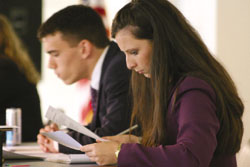 A report on the 10th Annual NCFCA Debate Tournament held at Patrick Henry College.
A report on the 10th Annual NCFCA Debate Tournament held at Patrick Henry College.

|
 |
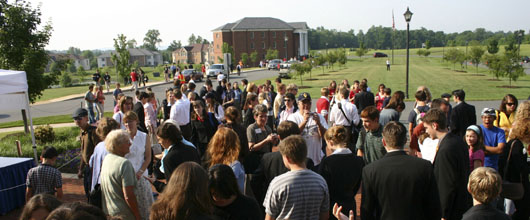
Wet palms. Stuttering. The terrible feeling in your middle when no words will come. That's what most people imagine when they think of public speaking. Not so with the more than five hundred well-trained homeschooled high schoolers who converged on Patrick Henry College's campus during the week of June 5th for the 10th Annual National Christian Forensics and Communication Association (NCFCA) National Tournament. The competitors and 2,000 other visitors, guests, and family members swarmed the college campus, swapping stories, visiting, and furiously arguing debate resolutions. Professionally dressed in suits and dresses, these young people appeared confident and assured. Whether they won or lost at the national competition, almost all were already skilled artists at presenting an argument in public. Each 12- to 18-year-old had excelled in qualifying and regional tournaments over the previous months.
Patrick Henry College provided a fitting venue for the national tournament, with its imposing, red brick buildings and colonial pillars. The college had ushered out its fifth class of graduates only three weeks before. A huge white tent stood on the Frisbee field to shelter graduation refreshments, and the campus grounds crew left it standing for the NCFCA tournament. Movers and students workers had hustled to transform dorm rooms into spaces to host debate rounds, moving out innumerable heavy bunk beds and desks. Dr. Michael Farris, co-founder of the Home School Legal Defense Association (HSLDA), whose married daughter, Christy Shipe, is Vice President of the NCFCA, wanted to create a first-class atmosphere. Attendees say that he succeeded.
Why so much effort for a debate tournament? Words have influence, and those who harness words possess that influence. High schools and colleges have always realized the power of words, and so have managed debate and speech clubs for centuries. The NCFCA goes even further than that, however. It prepares young communicators for the specific purpose of serving Christ. "Public speaking is the #1 fear of Americans, even more so than death," writes Susan Brown, employee with Communicators for Christ and sister of the first-place Lincoln-Douglas speaker, on her blog. "That means that at a funeral, most would rather be in the casket than giving the eulogy. One statistic says that only 5 percent of Americans are willing to speak in public. Those 5 percent are the ones we listen to. Christians are the ones with the truth. Shouldn't we be the most effective communicators out there?"

Students review their information during a debate |
With this mission, the NCFCA has grown at an incredible rate. According to its website (
ncfca.org), it operates "working in cooperation with HSLDA." Dr. Michael Farris and Dr. J. Michael Smith co-founded HSLDA in 1983, which quickly expanded its network of homeschoolers in order to increase its lobbying force. In 1997, the HSLDA (Homeschool Legal Defense Association) formed the NCFCA, using the nationwide connections already established. That first year only 32 competitors attended the national tournament. The organization's numbers have ballooned in the last ten years. This is hardly surprising. The sport of debate is deeply suited to the homeschool community.
The most fundamental advantage homeschoolers have in learning to debate is dedicated time. Students learn the debate resolution at the start of the competition year, and are then able, if they so desire, to structure their entire curriculum, minus math and science, around debate. For example, this year's Lincoln-Douglas Values Debate resolution was "Resolved: That the media's right to protect confidential sources is more important than the public's right to know." Students had to analyze issues both for and against this statement, which involved knowledge of historical events, law, definitions, and philosophy. A competitor had to integrate all these topics into a single, focused argument. He also had to be thorough. If he missed something important, somebody else might win.
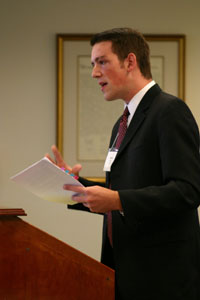
Ryan Zick (MD) argues his point in the medical malpractice debate |
Debate also suits the nature of the homeschool community. Homeschooling is a difficult undertaking, and, although almost everyone now respects homeschooling, still only a relative few families actually try it. We are still outside the mainstream, and we're used to defending our educational choice. This requires excellent skills of argumentation. Most of us are therefore delighted to improve our abilities to speak in public because we expect to use our skills time and time again.
Still, homeschool debaters have their own handicaps to overcome, the greatest of which is geographical distance. Public-school clubs meet in schools, where they can critique each other face-to-face. Many homeschool clubs, such as Natalie Webb's International Debate Club (see next article), meet online. For example, Nathan Brown, who won the first-place speaker award in the Lincoln-Douglas division at NCFCA Nationals, lives in Tennessee. He organized his club with six students from Texas and Louisiana. The seven of them exchanged research and debate cases over the Internet and took care to arrive early for tournaments in order to practice debating and to critique delivery.
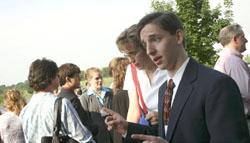
Outside Founders hall, a student discusses his case |
Of course, it is the difficulties and challenges of debate that make the activity worthwhile. I completed a single year of debate, in my freshman year at PHC. Speaking skills do not come any more naturally to me than they do to anyone else. I both hated and loved the experience, but almost the first thing I noticed was how my ability to multitask in a classroom had improved. I could listen, distill my notes to those items that I had to write down to remember, and form questions in my mind-all at once! Debate forces these skills into you through intense, one-hour rounds in which you typically have a minute or less to prepare your next speech.
I also noticed a newfound ability to separate issues from emotions. Debate trains this ability by requiring you to study arguments for both sides of an issue. In the preliminary bouts of a debate tournament you typically argue three rounds for the resolution and three against, alternating each hour. You learn that many policy issues are not as simple as the "one right" choice, but are rather about balancing all the evidence and finding what is the best way to use limited resources. Even then, others may disagree with your choice, and they may have legitimate reasons for doing so. This is sobering, maturing knowledge.
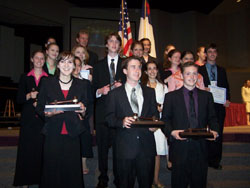
The top Lincoln-Douglas National NCFCA speakers, with first-place Nathan Brown in lower right |
So if your kids try debate, they will grow. As a teen, I was used to doing well in academic competitions against other students. Debaters, on the other hand, face a standard of excellence. Audiences always analyze speakers, determining whether they enjoyed or learned from their talks, and flaws in presentation can destroy the entire message. When you debate, you learn that sheer intelligence is never enough for success. Your understanding of other human beings and 100 percent effort win the day.
Says Susan Brown of her champion debater brother, "I can see better than he can the difference in his character. For my brother, it's not about sounding smart and having all the snappy answers. That means nothing if no one understands you. Nathan understands that it's not about him, and that mindset not only affects his debates, but his everyday conversations as well. That is the reason I am so proud of him."
Interested in debate? Give it a try! Your kids will learn real skills for the real world. And perhaps someday they too will compete at NCFCA Nationals.